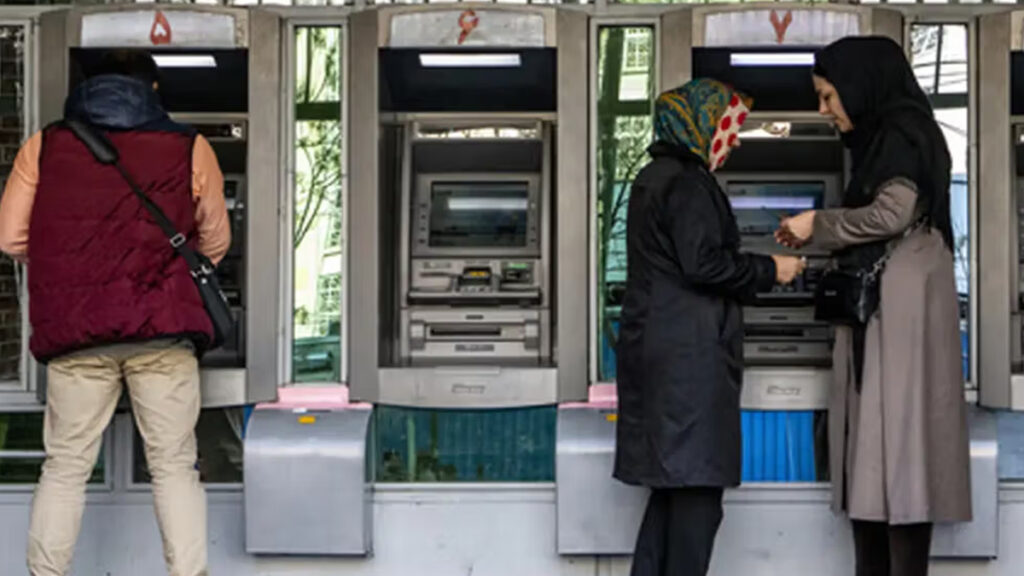Banking and Internet Services in Iran are facing a catastrophic collapse as Israeli airstrikes and the broader war effort intensify. Massive population displacement from several Iranian cities has triggered widespread disruptions, plunging the country’s financial systems and online infrastructure into chaos. Iranians, both within the country and abroad, are now caught in a web of blocked access, failed transactions, and digital isolation.
According to a report by Iran International, the ongoing military conflict and coordinated cyberattacks have devastated the nation’s banking and internet services, making daily life nearly impossible for millions.
Banking System Crashes Nationwide
Hacker group Predatory Sparrow has claimed to have destroyed the entire database of Iran’s Sepah Bank. As a result, ATMs across Iran have become non-functional. In major cities like Tehran, people report that cash machines are either out of order or completely emptied of cash. Despite reassurances from state-owned banks, users complain, “We checked ten ATMs — none gave us money.”
Several other major banks, including Bank Melli, Pasargad, and Eghtesad-e Novin, are experiencing severe service disruptions. With banking and internet services failing in tandem, digital payments, card transactions, and mobile banking have largely ceased.
Internet Blackouts Add to the Crisis
The war’s toll extends beyond the battlefield. Banking and internet services are intertwined, and Iran’s digital infrastructure is collapsing. Internet speeds in Tehran and other major cities have dropped drastically, and full connectivity is unavailable in many areas. Providers like Irancell have halted services entirely, cutting off citizens from digital payment platforms and essential communication channels.
This has paralyzed daily life residents can’t use ride-sharing apps, food delivery platforms, or even simple mobile money services. For a modern society, this shutdown has created a digital blackout.
Read More: 2 SUST Students Detained for Allegedly Raping Female Classmate and Filming Her
The collapse of Iran’s banking and internet services isn’t just local. Iranians living in countries like Turkey, the UAE, and across Europe are also suffering. Due to disabled roaming services, they cannot receive OTP codes (one-time passwords) necessary for online banking or cryptocurrency transactions.
Cryptocurrency users, particularly those dealing in USDT (Tether), are reporting that their transactions are being blocked. Even decentralized finance has become unreachable for ordinary Iranians in this crisis.
IT expert Sahar Tahvili explains that Iran’s digital systems are not equipped to withstand high-level cyberwarfare. “In modern warfare, cyberattacks target transport, communication, banking, and energy systems to cripple a nation. Iran is no exception,” she noted.
In response, Iran’s Cybersecurity Command has banned public network usage for government officials, a likely effort to thwart cyber intrusions similar to last year’s Israeli cyber strike on Hezbollah’s pager systems.
Many Iranians who had traveled abroad for work or vacation are now unable to return home due to flight cancellations. Worse, the banking and internet services failure means they cannot pay for hotels, meals, or medical emergencies. Even emergency usage of cryptocurrency has failed because Iranian access is being geo-blocked.
With digital payments frozen, Iran’s traditional fallback gold has also been hit. Gold shops are shut, and online gold trading platforms are down. Pensioners, especially retired soldiers and government staff who depend on Sepah Bank, have been unable to access their monthly payments.
The war with Israel has pushed Iran to the edge. The collapse of banking and internet services has created a perfect storm financial paralysis, digital isolation, and mass psychological stress. In a country where most services are now digitized, the inability to pay, communicate, or even withdraw cash is a national emergency.
Authorities have placed military and intelligence units on alert to try to regain control. But experts warn that the situation could rapidly deteriorate further if another round of missile strikes or cyberattacks occurs.
Share via:


















